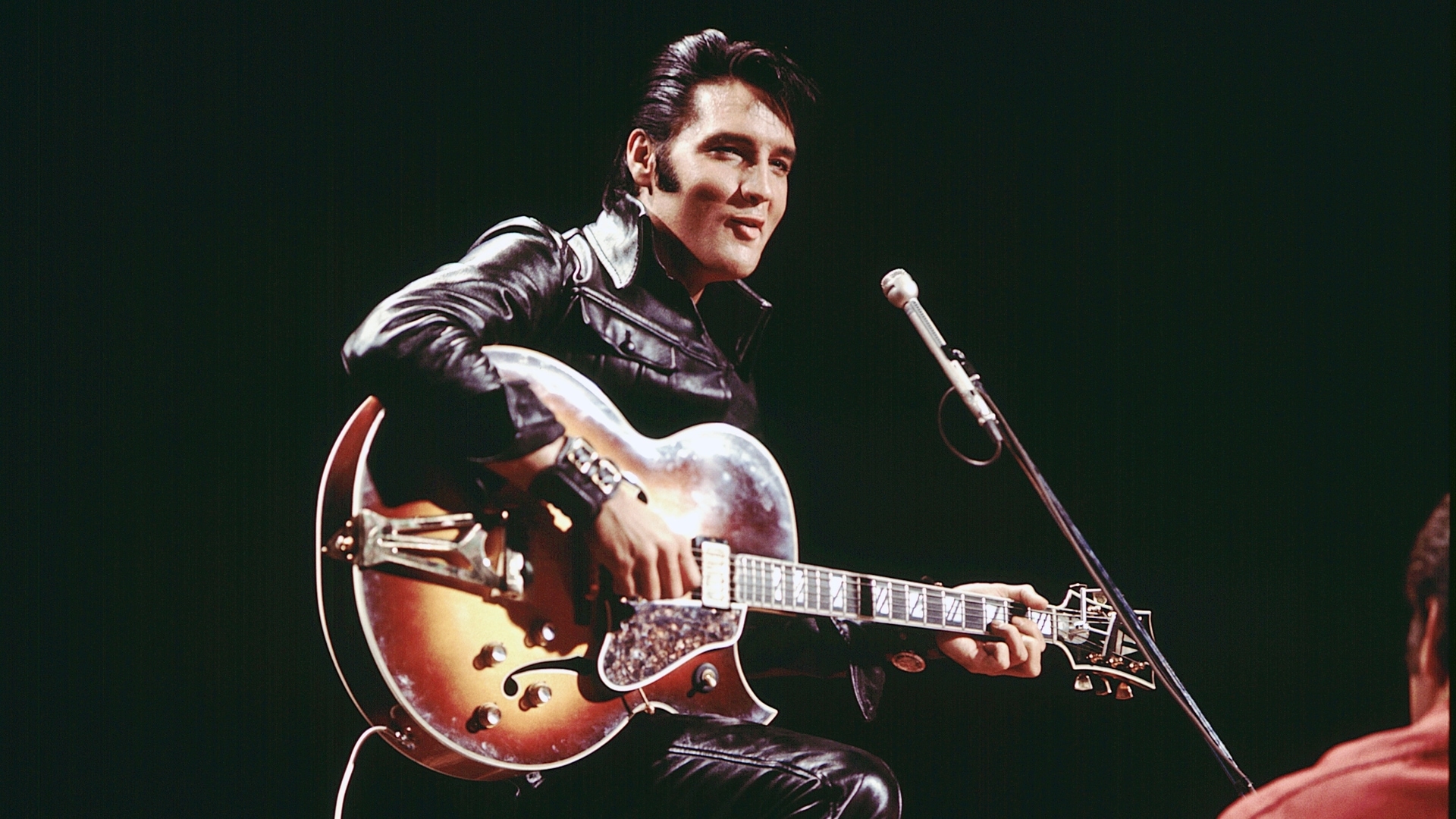Specially written for him by Earl Brown, this gentlest of protest songs was the grand finale to Elvis, the original title of a one-hour NBC television spectacular destined by virtue of its legacy-saving impact to gain mythological status as his ’68 Comeback Special. Fifty years on, it remains the defining act of Presley’s career, the past shock of his Fifties pelvic thrills resuscitated, the pomp of his rhinestoned Seventies future assured. And where the sins of some two dozen beach’n’bikini Technicolor stinkers were erased from history in the frug of a black leather jacket: for Comeback we could just as easily substitute Redemption.
But for Elvis, crucially the ’68 Comeback Special was the moment he finally found not only his place but his voice in a decade of cultural and political revolution which had hitherto ostracised him as an irrelevant mute.
It’s not that Elvis didn’t want to join the Sixties. In private, he listened to Stax and Motown, had Beatles 45s on his home jukebox, sang Dylan songs, collected books on JFK, watched Star Trek and Stanley Kubrick movies, read Timothy Leary, dabbled with marijuana and, once, even tried acid. But having stopped playing live in 1961, and virtually been gagged from speaking to the press, by the mid-Sixties his public image was at the mercy of the succession of big screen buffoons Colonel Parker queued up for him. And so as young Americans were being slaughtered by the thousand in Vietnam, Elvis was playing chopper pilot “Rick” warbling “nuzzle her muzzle” to a cockpit of yapping dogs.
This was his Sixties’ Shawshank, and the reason why the ’68 Comeback Special is rightly revered as his divine breakout. The great irony being that his movie career was actually the catalyst, the special only originating through a deal with NBC who agreed to finance a new Elvis film on condition they received an extra TV show for the same money. A case of buy one turkey, get one golden goose free.
Notoriously, Colonel Parker assumed the December broadcast would mean a typical Christmas show with a Val Doonican Elvis buried under woollens and fake snow crooning Little Donkey to toddlers in pyjamas. That instead the world wilted to the lusting leather Sex Elvis of the ’68 Comeback Special’s celebrated Unplugged-style jam was largely down to director Steve Binder, the jam itself his attempt to recreate the spontaneous off-camera magic he’d witnessed every night in Elvis’s dressing room. Like the corner man to a champion heavyweight, Binder coaxed Elvis to throw his fiercest punches. But all credit for the responding knockout blows must go to Elvis’s muscle alone.
Advertising helps fund Big Issue’s mission to end poverty
The same is true of the closing anti-war, anti-racist, anti-hate anthem If I Can Dream, which wouldn’t have happened had Elvis not been in development meetings at Binder’s West Hollywood office the night of 1968’s other shock assassination. On 5 June, just two months after King’s death, JFK’s brother, Democratic presidential candidate Robert Kennedy, was murdered at LA’s downtown Ambassador Hotel. Five miles away, Elvis and Binder’s staff watched the horror unfold live on television.
“That’s when we stopped rehearsing and went back into the piano room and sat around with Elvis talking about what was going on in America,” Binder recalled. The team, including composer Earl Brown, stayed there until 4 am listening to the singer grieve for Kennedy, the country, and for King, a dark night of political soul-baring prompting Brown to write his timely hymn for a broken nation. Even if King’s 1963 March On Washington sermon dictated the title, the muse for If I Can Dream was entirely Elvis.
https://www.youtube.com/watch?v=eJwk9ihHvQM
The tragedy is that barely two years after the ’68 Comeback Special first aired, the liberal Elvis of If I Can Dream and 1969’s similarly righteous In The Ghetto had become the paranoid commie-hunter shaking hands with Nixon in the Oval Office (though, if it’s any excuse, by that point he had more pills in his bloodstream than most branches of Boots). Just as bitterly, while Binder’s show freed Elvis from Hollywood, Colonel Parker quickly incarcerated him in the fresh hell of Las Vegas from whence he’d never escape.
None of which diminishes the enduring awe of the ’68 Comeback Special, even as it forever teases us with what might have been. Elvis the newly-radicalised activist on anti-’Nam marches with “Hanoi Jane” Fonda? Or a black leather jam world tour, the stadia of Hampden and Wembley still vibrating to this day with echoes of the most euphoric rock’n’roll gigs in human existence?
Like the song says, we can but dream.
Advertising helps fund Big Issue’s mission to end poverty
Simon Goddard is the author of The Comeback: Elvis and the Story of the 68 Special published on September 6 by Omnibus Press
The Elvis: ’68 Comeback Special will be playing in over 290 cinemas in for one night only on 16 August. Purchase tickets #Elvis68ComebackSpecial
Image: Getty









